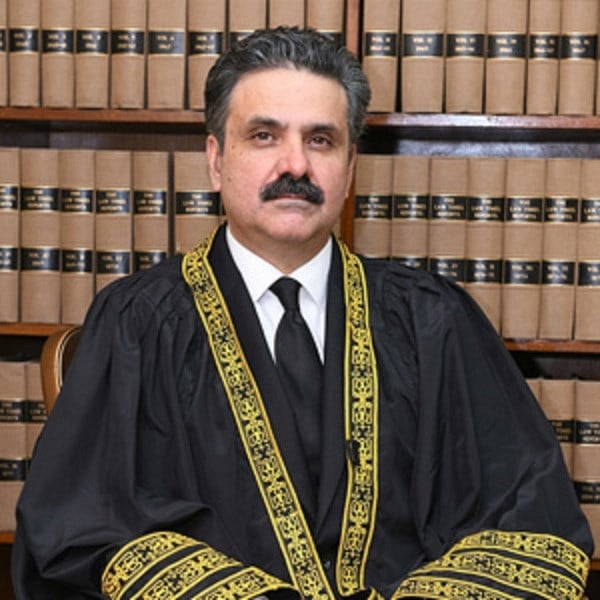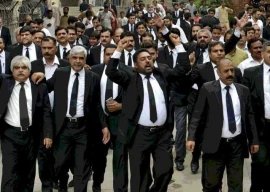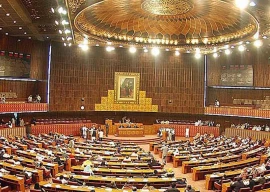
Chief Justice of Pakistan, Justice Yahya Afridi, lead an inaugural meeting regarding reforming Pakistan's prison system.
The participants of the meeting included Lahore High Court’s Chief Justice Aalia Neelum, Administrative Judge Justice Shams Mehmood Mirza, officials from the Home and Prosecution Departments, police, prison authorities, and human rights activist Saima Amin Khawaja.
Members of both trearury and opposition parties, including Senator Ahad Khan Cheema and Ms. Khadijah Shah, also contributed to the meeting bringing in personal insights from time spent in prison.
This session initiated discussions for a National Jail Reform Policy focused on inmate welfare and aligning with international standards such as the Nelson Mandela, Bangkok, and Beijing Rules.
Chief Justice Afridi highlighted Pakistan’s overcrowded prison conditions, referencing data from the Law and Justice Commission of Pakistan (LJCP), which shows a national inmate population of over 108,000 against a capacity of 66,625.
Punjab’s prisons are especially strained, housing nearly twice their intended capacity with over 36,000 under-trial prisoners, many awaiting trial for over a year.
A phased approach to reforms will begin in Punjab, emphasising a reduction in under-trial detentions and expanded rehabilitative programs for inmates.
Chief Justice Afridi outlined the proposal for a Jail Reforms Committee, which will focus on reducing overcrowding, enhancing inmate welfare, and implementing alternative sentencing options like probation and community service.
A sub-committee, led by retired Justice Shabbar Raza Rizvi, alongside Ms. Khawaja, Senator Cheema, and Ms. Shah, will conduct jail inspections and provide recommendations to improve processes, reduce pre-trial detention, and introduce vocational and mental health support programs.
With the support of the LJCP's data and analytical insights, this initiative aims to establish a fairer, more humane prison system in Pakistan, prioritising rehabilitation, efficient case management, and inmates’ dignified reintegration into society.
Parliament submits names of Judicial Commission nominees to Supreme Court
In a seperate development, the process of forming a Judicial Commission for the appointment of judges to the higher judiciary has made progress, with the names of parliamentarians from both the National Assembly and Senate submitted to the Supreme Court.
Chairman of the Senate, Syed Yousaf Raza Gillani, directed the Registrar of the Supreme Court to send nominations for the Judicial Commission, based on the advice of Leader of the House Senator Ishaq Dar and Leader of the Opposition Senator Shibli Faraz.
The nominees include Senator Farooq H. Naek and Senator Shibli Faraz from the government and opposition benches, respectively.
Meanwhile, National Assembly Speaker Sardar Ayaz Sadiq has also communicated with the Supreme Judicial Commission, providing the names nominated by parliamentary parties.
For the Judicial Commission from the National Assembly, opposition leader Omar Ayub and Sheikh Aftab from the Pakistan Muslim League-Nawaz have been nominated, along with Roshan Khorasani Brocha for the reserved women’s seat.
According to the National Assembly spokesperson, following the approval of the 26th Amendment, the Judicial Commission will now include five parliament members, with all nominations forwarded to the Secretary of the Judicial Commission.
The nominations submitted by Parliament ensure equal representation from both the government and the opposition.
Speaker Ayaz Sadiq consulted with Chairman Senate Yousaf Raza Gillani and all parliamentary parties before finalizing the names, which have now been received by the Supreme Court.
The freshly-amended Article 175-A states that a 13-member judicial commission, comprising the chief justice, three most senior judges of the Supreme Court, most senior judge of the constitutional benches, law minister, attorney general for Pakistan, a nominee from the Pakistan Bar Council, two members each from the National Assembly and the Senate, and a woman or non-Muslim from outside parliament will work for the appointment of the judge in the Supreme Court, high court and the federal Shariat Court.
Key nominations
The NA spokesperson confirmed the selection of key nominees, including Opposition Leader Omar Ayub and PML-N's Sheikh Aftab Ahmed from the National Assembly, while Senators Farooq Naek (PPP) and Shibli Faraz (PTI) have been nominated from the Senate.
Additionally, Roshan Khursheed Bharucha has been appointed to fill the commission’s designated seat for women.
According to the spokesperson, “All nominations have been forwarded to the Secretary of the Judicial Commission.”
These appointments form part of the larger effort to balance representation from both government and opposition within the JCP, now tasked with overseeing judicial appointments and forming constitutional benches for the apex court.
With the 26th Amendment now in effect, five parliamentarians join the JCP, which will now include five judges, including the Chief Justice of Pakistan, as well as a representative from the Pakistan Bar Council (PBC).
The expanded commission will play a pivotal role in selecting superior court judges, a move widely viewed as part of ongoing judicial reform efforts aimed at increasing transparency and representation within the judiciary.
Yesterday, the Senate Standing Committee on Justice approved a bill proposing an increase in the number of judges in the Supreme Court from 17 to 25. The bill managed to get approved despite opposition from the Pakistan Tehreek-e-Insaf (PTI) and Jamiat Ulema-e-Islam (JUI).
As of today, the nominations have reached the Supreme Court, and the newly constituted JCP is expected to begin deliberations on upcoming appointments and case allocations in the near future.



1725967717-0/Untitled-design-(3)1725967717-0-165x106.webp)




1730564373-0/Express-Tribune-Web-(19)1730564373-0-270x192.webp)










COMMENTS
Comments are moderated and generally will be posted if they are on-topic and not abusive.
For more information, please see our Comments FAQ